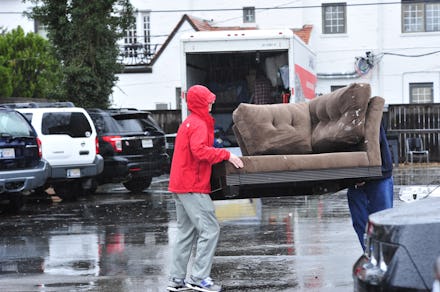The Side of the Oklahoma Racist Frat Story That Nobody Is Talking About

Americans have no idea what to do about racism. "Racists"? We can handle those.
Racists are loud and obvious. Racists can't hide; they trip and reveal themselves. Their emails leak. Videos of them circulate. Racists lose jobs and favor, because racists have bosses, and bosses know the best way to show they're not racist is to point at racists and say, "That's the bad guy."
Racism is a different matter entirely. Racism doesn't pop up in bold letters, or in outraged headlines on cable news. Racism doesn't have a boss. To find it, you have to look past the racists, beyond the ranting bigots and their stomach-churning words. Racism thrives in systems and practices. Racism is hard at work in America, whether people see it clearly or not.
On Monday morning, a group of U-Haul vans parked in front of the Sigma Alpha Epsilon fraternity house at the University of Oklahoma and their drivers started gutting the place. The night before, a video had leaked in which fraternity members were heard singing, "You can hang 'em from a tree, but they'll never sign with me. There will never be a nigger in SAE."
This was national news. These are what we call "racists."
The backlash against SAE was predictably swift: The frat's national headquarters shut down their Oklahoma chapter, while University of Oklahoma president David Boren severed all school ties with the organization. "You are disgraceful," he told its members in a highly publicized statement.
What he didn't do was talk about racism.
Racism is bigger than a video. Racism is the legacy of being "the only national fraternity founded in the antebellum South," with a Civil War-era membership class of 400, of whom 369 fought for the Confederacy. Racism is a school housing an organization with a documented history of racial abuse; SAE chapters in St. Louis, Memphis, Clemson, South Carolina and elsewhere have all been embroiled in racism controversies. Racism is the truth behind the frat brother's song, that there probably never was a "nigger" at SAE, or at least none in significant numbers.
We've gotten pretty good at spotting racists in America, and we're okay at punishing them too. But the structures and systems that produce the racists still elude us. Instead, they embed themselves in our psyche and masquerade as the natural order. It's why incidents like the SAE debacle seem to come out of nowhere and shock us out of our post-racial revery. It's why the police in Ferguson, Missouri, can spend years brutalizing and killing black citizens, but only lose their jobs when we discover the offensive jokes they make over email.
Americans seem largely incapable of recognizing racism in practice, de facto racism, systemic racism. We only see racism when the racists are here to scream about it. This is bad. Until we make a concerted effort to expand our understanding and vocabulary around racial inequality, the racial wages of gerrymandering, wealth preservation, mass incarceration and police violence will continue unabated. So enough patting ourselves on the back for the "progress" we've made — even our perceived racial progressivism is largely overstated. Today, there's real work to be done.